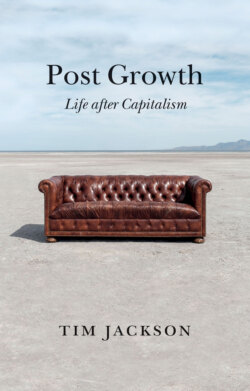Читать книгу Post Growth - Tim Jackson - Страница 11
A little macroeconomics
ОглавлениеIn the simplest of terms, the GDP is a measure of the size of a country’s economy: how much is produced, how much is earned and how much is spent across the nation. It’s counted, needless to say, in monetary values: dollars, euros, yuan and yen. It is the headline measure within a complex System of National Accounts, which since 1953 has provided the international standard for measuring the economic performance of the nation. Developed during the Second World War, the accounts were motivated in part by the need to determine how much governments could afford to spend on the war effort.9
By 1968, the size of the GDP had become a near ubiquitous indicator of political success. The formation of the Group of Seven (G7) nations in the early 1970s and the Group of Twenty (G20) nations in the 1990s cemented its influence. This one number became the single most important policy indicator across the world. For more than half a century it has stood as an unrivalled proxy for social progress. All the more extraordinary, then, to find a critique of it on the opening day of a Presidential campaign.
When Kennedy started to talk economics, the crowd grew quieter, Walinsky told me, attentive to the content as well as the rhetoric of the Senator’s vision. His argument was blindingly simple. The statistic in which we place so much faith simply counts the wrong things. It includes too many ‘bads’ that detract from our quality of life and excludes too many ‘goods’ that really matter to us. The GDP ‘counts air pollution and cigarette advertising, and ambulances to clear our highways of carnage’, Kennedy told the University of Kansas crowd:
It counts special locks for our doors and the jails for the people who break them. It counts the destruction of the redwood and the loss of our natural wonder in chaotic sprawl. It counts napalm and counts nuclear warheads and armored cars for the police to fight the riots in our cities. It counts Whitman’s rifle and Speck’s knife, and the television programs which glorify violence in order to sell toys to our children.10
And even as it erroneously includes all these things as benefits to us, there are numerous aspects of our lives that simply go missing from the tally. The inequality in our society. The contributions of those who are unpaid. The labour of those who care for the young and the elderly at home. It fails to measure ‘the health of our children, the quality of their education or the joy of their play’. It misses ‘the beauty of our poetry . . . the intelligence of our public debate . . . the integrity of our public officials’.
It would be rare to find a politician speaking in such terms today. We’ve become ever more captured by the language of growth. Our politics has become increasingly distanced from decency, integrity and public value. Our obsession with the GDP bears some of the responsibility for this. That single number ‘measures neither our wit nor our courage, neither our wisdom nor our learning, neither our compassion nor our devotion to our country’, concluded Kennedy. ‘It measures everything in short, except that which makes life worthwhile.’ At the end of his critique, he paused momentarily. The audience began to applaud. Not with the wildness of the earlier cheering, Walinsky recalled. ‘Now their applause was serious, thoughtful. But it seemed like it might go on all day,’ he said.
It’s hard to convey how extraordinary Kennedy’s remarks that day were. In the late 1960s, the US economy was growing at around 5% each year. It was assumed that those levels of growth would continue indefinitely. Economics itself was built around the assumption that they would do so forever. Yet here was a politician, not just any politician, but one aspiring to be President of the largest economy on the planet, casting doubt on capitalism’s most sacred shibboleth: the relentless accumulation of wealth.11
Measuring the ‘busyness’ of the economy and calling that progress never was and never will be the route to a lasting prosperity. That was the blunt message conveyed so eloquently in RFK’s address to the Kansas students. It was destined to become the poster-speech for a critique of the GDP which has lasted to this day.12
